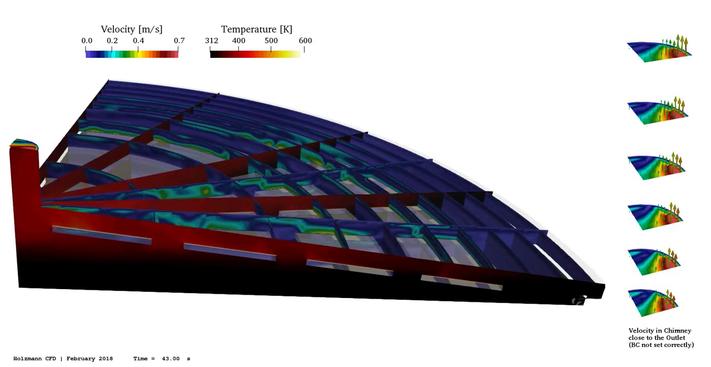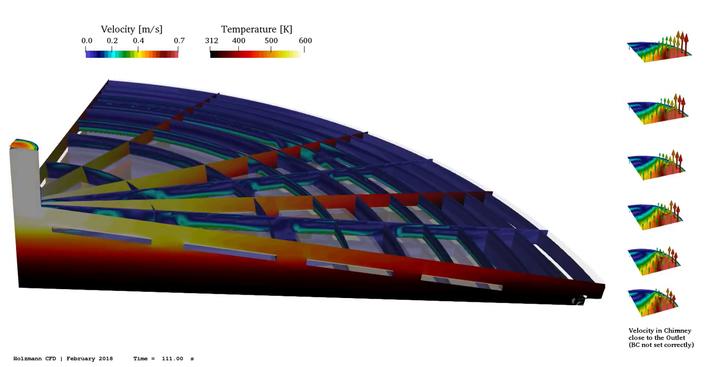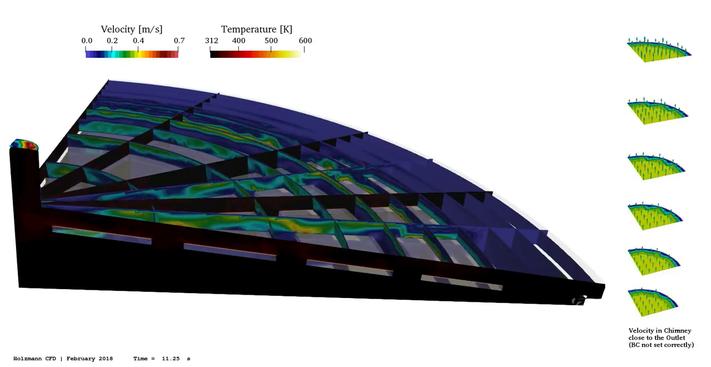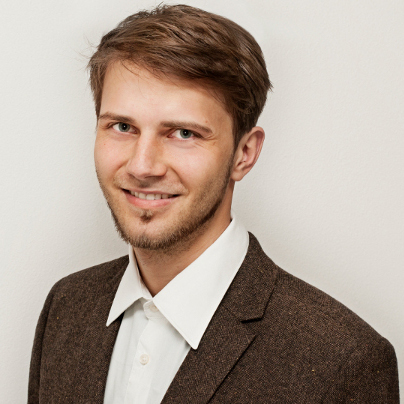Solar Chimney
buoyantFoam, free-convection, arbitrary scenario, energy transport
» Since version 8, the training case was improved in terms of boundary conditions.
Pure free convection analyses are critical to perform by using OpenFOAM®. The keyword for such problems is to start with »transient« algorithms. Most people do make a mistake to begin analyzing such problems using steady-state solvers. However, steady-state solvers cannot handle such investigations out of the box as the boundary conditions are commonly set for multiple solutions. While starting with transient methods, one pushes the numerical solution in the correct direction. The time-step is the limiting factor that we do have to take into account. While steady-state solvers are non-consistent in time and, e.g., the SIMPLE algorithm in pressure too, the solution goes commonly in the wrong direction. Tobias investigated into a simple free-convection case during his Ph.D. time more than three days for an OpenFOAM® user. The outcome was that it is not possible to use steady-state solvers if one does not want to set the relaxation factors to values such as 0.0001. Everybody aware of numerics knows that such costs are mostly related to wrong set-ups or algorithms that are not suited for such cases
Free-convection scenarios are not suited for steady-state algorithms
The training case models a solar chimney (arbitrary dimensions). The flow field is established based on the buoyancy force, while no additional effects, such as forced convection, are applied. The solar panels are modeled using fixed temperature boundary conditions. An extended boundary condition could be implemented but does not influence the buoyancy set-up. After the mesh generation (including the layer generation), a decomposition follows. The solver is operating in PIMPLE mode as a steady-state algorithm cannot handle such a problem; sure, after a direction of the solution is found, one can switch to a steady-state solver to speed-up the convergence. The training case also includes the advanced ParaView® and extraordinary Blender® states.



Published under the GNU General Public License 3
Over the last ten years, Tobias tried to publish a wide range of different materials related to OpenFOAM® and CFD. You know it much better than he does if the content is worth to be supported. If you want to thank Tobias for the work he did, feel free to tell the community your opinion about the work Tobias Holzmann is doing or you can email your thoughts directly to »
Support the work of Tobias Holzmann
The available OpenFOAM® training cases are tested and built for different OpenFOAM® versions (not distributions) on a Linux machine. During the tests, only the OpenFOAM Foundation version of OpenFOAM® was used. Furthermore, the following software packages are required for most of the training cases: Salome®, ParaView®, and for optimization tasks, one also needs the open-source software DAKOTA®. The OpenFOAM® cases might work with the ESI version of OpenFOAM® but it is not supported. For the OpenFOAM® extend project, the training cases will probably not work as the code diverged too much. Additionally, there is no support for Windows-based and MAC-based OpenFOAM® versions.
This offering is not approved or endorsed by OpenCFD Limited, producer and distributor of the OpenFOAM software via www.openfoam.com, and owner of the OPENFOAM® and OpenCFD® trade marks
Share the work on Your social network
Tobias would be grateful if you share his work on your social network in order to keep the OpenFOAM® community up to date. Furthermore, sharing the work will avoid that people investigate into topics, that are already prepared for your study such as the examples provided by Tobias Holzmann.


